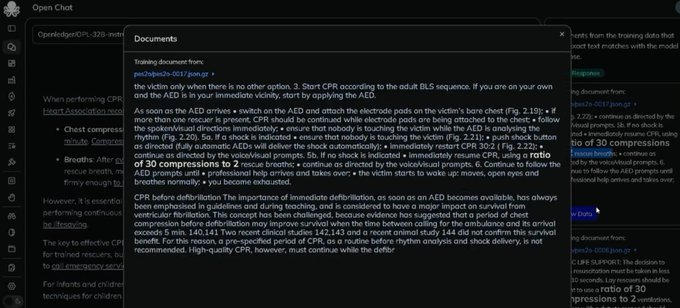This article is machine translated
Show original
Here's the translation:
Let's talk about OpenChat, recently released by @OpenledgerHQ, which under the banner of "Proof of Attribution" claims to ensure that every contributor to AI-generated content receives their due compensation. How exactly will they do this?
1) From a product implementation perspective, OpenChat is indeed attempting a technically challenging task. Its core selling point is: every message you send, shared dataset, and fine-tuned model will be recorded on-chain, and you'll receive a share of profits once used by others.
From a technical perspective, this is thanks to its "attribution engine", a high-fidelity ∞-gram language model that uses suffix arrays to perform millisecond-level matching across trillions of Tokens, breaking down each sentence into Token windows, using vector embedding logic through BERT, Sentence-T5, and precisely matching to original data sources.
Simply put, it's like installing a "super microscope" for AI content generation, where the "DNA" of each Token can be traced. The user interface will underline which content comes from which dataset, with confidence scores clearly marked. Each chat will trigger an on-chain transaction in real-time, calculating platform fees, data network costs, and model fees - you'll be paid based on how many sentences of your data are used.
2) After analyzing the product logic, OpenChat's business logic becomes clear: attempting to reconstruct the entire value distribution system for AI content generation. Traditional AI services are "black-box profit sharing" - you call the OpenAI interface without knowing how profits are divided. OpenChat aims to make every AI call a "public accounting", where data contributors and model developers can receive real-time profit shares based on their contributions.
Plainly speaking, Openledger is building an AI technical sovereignty data blockchain, abstracting a three-layer technical architecture: bottom-layer chain protocol, mid-layer attribution engine, top-layer user application. Clearly, OpenChat is a technical validation of OpenLedger's entire technical architecture, "concretizing" the abstract AI data contribution public accounting system through a chat interface.
Its goal is to verify: data calls can be completely transparent, the source of each Token can be precisely traced, and value distribution can be executed automatically in real-time.
3) However, precisely tracking and on-chain recording of large-scale data is not easy, especially in the "on-chain design". OpenLedger chose a heavy "real-time on-chain" approach, ensuring instant profit sharing for each conversation. Just thinking about it reveals the significant considerations for gas fees and transaction frequency.
This design directly faces performance bottlenecks. If OpenChat has tens of thousands of simultaneous online users, it might generate hundreds of thousands of attribution calculations and profit-sharing transactions per second, a throughput TPS that far exceeds most public chains' processing capabilities. Even on a relatively high-performance sidechain, ensuring millisecond-level attribution matching with real-time on-chain settlement places extremely high demands on the entire technical stack.
A more realistic issue is economic feasibility. Each on-chain transaction requires gas fees, and even if individual fees are low, the cost would become a burden for users at scale. Will users be willing to bear additional fees for each chat for the sake of "fair accounting"?
In fact, Openledger could have chosen a compromise of batch settlement or periodic on-chain recording, but by selecting real-time on-chain and instant fair distribution, they are clearly attempting an extreme exploration. Whether they will ultimately adjust the mechanism is unknown, but such an attempt is quite meaningful.

I also did some research. In short, OpenLedger uses a product similar to OpenChat MVP to basically explain its major goals: open data platform, proof of attribution, incentive flywheel
Let the product speak for itself.
Really, this is actually very good, better than talking all the time
From Twitter
Disclaimer: The content above is only the author's opinion which does not represent any position of Followin, and is not intended as, and shall not be understood or construed as, investment advice from Followin.
Like
Add to Favorites
Comments
Share
Relevant content






